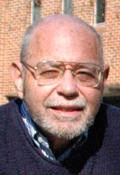Paul Gottfried
Paul Edward Gottfried | |
|---|---|
 Paul E. Gottfried | |
| Born | November 21, 1941 (age 82) |
| Era | Contemporary philosophy |
| Region | Western Philosophy |
| School | Paleoconservatism |
Main interests | Welfare state, democratic pluralism, Romanticism |
Paul Edward Gottfried (born November 21, 1941) is an American paleoconservative political philosopher, intellectual historian, columnist and former Horace Raffensperger Professor of Humanities at Elizabethtown College in Elizabethtown, Pennsylvania, as well as a Guggenheim recipient. He is currently H. L. Mencken Club President.[1]
Early life and education
Gottfried was born in The Bronx in 1941. His father was a successful furrier from Budapest, who had fled Hungary after the July Putsch of 1934. The family moved to Bridgeport shortly after his birth. Gottfried attended Yeshiva University in New York as an undergraduate and returned to Connecticut to attend Yale, where he studied under Herbert Marcuse. He belonged to the Yale Political Union’s Party of the Right.[2]
Career
He is the author of numerous books and articles detailing the influences which various German thinkers (such as Hegel and Schelling) have exerted on American conservative political theory, and was a friend of many political and intellectual figures: such as Richard Nixon, Pat Buchanan, John Lukacs, Thomas Molnar, Will Herberg, Samuel T. Francis, Paul Piccone, Murray Rothbard, Eugene Genovese, Christopher Lasch, and Robert Nisbet. Gottfried is a paleoconservative critic of neoconservativism within the Republican Party. In fact, the term paleoconservative was first used by Paul Gottfried and Thomas Fleming, with the "paleo" prefix meaning "old" in opposition to the "neo", or "new", conservatives. Gottfried is also notable as the first person to use the term "alternative right", when referring specifically to developments within American right-wing politics, in 2008.[3] The term has since gained wide currency with the rise of the so-called "alt-right".
Selected publications
Books
- Conservative Millenarians: The Romantic Experience in Bavaria, Fordham University Press, 1979 ISBN 978-0-8232-0982-8
- The Search for Historical Meaning: Hegel and the Postwar American Right, Northern Illinois Univ Press, 1986 ISBN 0-87580-114-5
- The Conservative Movement, Twayne Pub 1988, with Thomas Fleming (second edition 1992) ISBN 0-8057-9724-6
- Carl Schmitt: Politics and Theory, Greenwood Press 1990, ISBN 0-313-27209-3
- After Liberalism: Mass Democracy in the Managerial State, Princeton University Press, 2001 ISBN 0-691-08982-5
- Multiculturalism and the Politics of Guilt: Towards a Secular Theocracy, University of Missouri Press, 2002 ISBN 0-8262-1417-7
- The Strange Death of Marxism: The European Left in the New Millennium, University of Missouri Press, 2005 ISBN 0-8262-1597-1
- Conservatism in America: Making Sense of the American Right, Palgrave-Macmillan, 2007 ISBN 0-230-61479-5
- Gottfried, Paul (May 15, 2009). Encounters: My Life with Nixon, Marcuse, and Other Friends and Teachers (1 edition ed.). Wilmington, Del: Intercollegiate Studies Institute. ISBN 978-1-933859-99-6.
{{cite book}}:|edition=has extra text (help) - Leo Strauss and the American Conservative Movement, Cambridge University Press, 2012 ISBN 978-1-1070-1724-5
- Fascism: The Career of a Concept, Northern Illinois University Press, 2015 ISBN 978-0-8758-0493-4
Articles
- “Anti-War Anti-Americanism?”. Telos 114 (Winter 1999). New York: Telos Press.
- “The Multicultural International”. Orbis (Winter 2002)
- “The Invincible Wilsonian Matrix”. Orbis (Spring 2007)
- “The WASP Roots of Liberal Internationalism”. Historically Speaking (Fall 2010)
References
- ^ "The HL Mencken Club". H. L. Mencken. Retrieved February 26, 2012.
- ^ Siegel, Jacob (2016). "Paul Gottfried, the Jewish Godfather of the 'Alt-Right'". Retrieved December 4, 2016.
- ^ "Meet the Jewish 'Paleoconservative' Who Coined The Term 'Alternative Right'". The Forward. Retrieved November 3, 2016.
